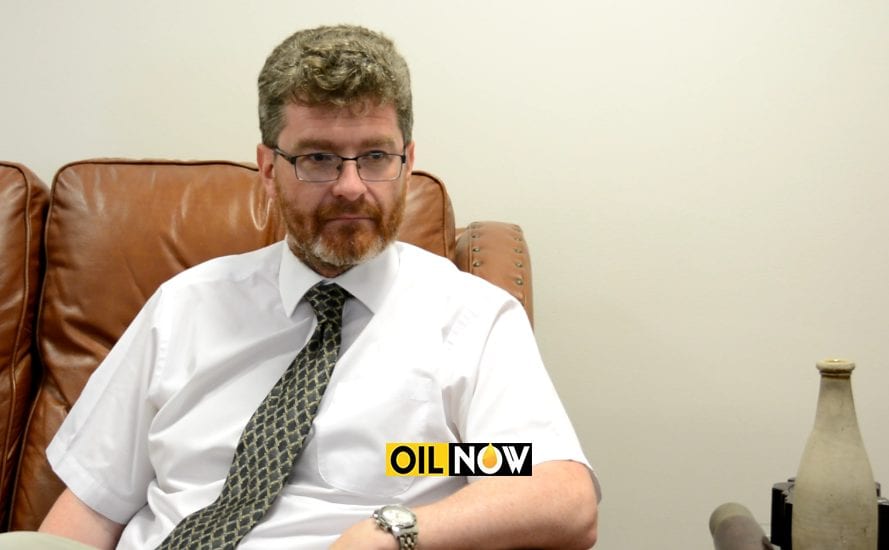With local content legislation now being conceptualized in Guyana, outgoing British High Commissioner, Greg Quinn, has said that a clear and realistic policy will be most helpful to investors.
Speaking with OilNOW about immediate priorities for Guyana’s oil and gas sector, Quinn said overseas investors need to understand what the requirements are to operate in the new oil producing country. “So, a clear but realistic process for local content will be helpful.”
He added that there is a “need to enhance training to ensure Guyanese benefit, not just from oil and gas, but also from the wider development of the economy that will happen as a result of oil and gas funding (and) to build genuine partnerships between overseas investors and local companies to ensure benefits for all.”
In an indication of how seriously the new government is taking the issue, President Irfaan Ali recently announced the formation of a Local Content Panel that is expected to review and make recommendations from which a legislative framework could be established.
But a local content policy that is acceptable to all seems elusive.
Guyana has already produced three drafts of a policy which took more than two and a half years to complete. In fact, it is only in February that the Head of the Department of Energy, Dr. Mark Bynoe released the completed policy to the public. Even then, the private sector had felt that the policy did not go far enough.
At a public local content policy forum facilitated by the Georgetown Chamber of Commerce and Industry (GCCI) in August 2019, Professor Leyland Lucas said that local content will be experienced years down the road. And prominent private sector member Ramesh Dookhoo charged that local content legislation is anti-competitive and flies in the face of World Trade Organisation rules and competition laws.
Deodat Indar, then immediate past president of the GCCI, now Minister within the Ministry of Public Works, had endorsed the policy but registered concerns about the criteria for qualification to be deemed a local company. He worried about ‘shop front’ businesses that may benefit from loopholes in the criteria as defined in the policy.
In response to that observation, Dr. Bynoe had said that the policy “has sought to better identify ‘how do you define a local?’, ‘How are you going to measure what is actually local content?’… if you become too pedantic, then much of your time will be spent trying to track and capture what is actually local.”
These are not the only criticisms that the policy faces; the new Minister of Natural Resources, Vickram Bharrat, said that after an initial perusal of the policy, he is of the impression that it “is more slanted to the investors rather than to the locals,” (and) “That is something that we need to look at and change.” He was at the time speaking on a local radio programme, Guyana’s Oil and You.
Last year when similar concerns were raised about the policy, US Ambassador to Guyana, Sarah-Ann Lynch, had cautioned that such concerns “may send a signal that some investors as well as the employment and know-how benefits they bring, may not be welcome here.”
Minister Bharrat also wants the policy to include “specifics with regards to how much business will come to Guyana, how many people will be employed.” He stressed too, that there is great need for capacity building and that in this regard, “we will be making demands for a percentage of the workforce to be Guyanese, we ought to equip them to work too and to deliver at the same time.”
Notwithstanding the criticisms of the policy, and the absence of local content legislation, ExxonMobil and its partners seem fully wedded to building capacity through training and direct employment, as well as supporting local sectors through the procurement of goods and services.
In August, ExxonMobil Guyana announced that more than 2000 Guyanese are supporting its operations in the country and have received training in the areas of Professional/Technical and Craft/Trade training; that more than 50 Guyanese have received international training in Brazil, Canada, Singapore, Trinidad, United Arab Emirates and United States; that more than 600 Guyanese suppliers were used for services ranging from food items to engineering, and, that it has spent over GYD$14 billion in the first half of 2020. So local content is already taking place.
Quinn believes that “a successful local content policy or legislation needs to be clear in terms of showing what companies are expected to do, including on training Guyanese to undertake particular jobs or activities but also realistic in understanding that you cannot do everything overnight. So, in some areas there will be a need to put in place a longer ‘hand over’ period before that particular skill or activity can be undertaken by someone from Guyana.”
Establishing a local content policy is not an easy task. It requires the will of government, investors and local businesses to create doable and realistic interventions that find common ground in policy objectives, the welfare and development of citizens and, the interests of the business community and investors. The complexity of these matters indicate that there is no one stop solution to resolving these challenges.
Local Content is always evolving, and any policy that will be successful has to be competitive and progressive both at local and international levels, for citizens and investors alike; and demonstrate the political will and national capacity to implement.




